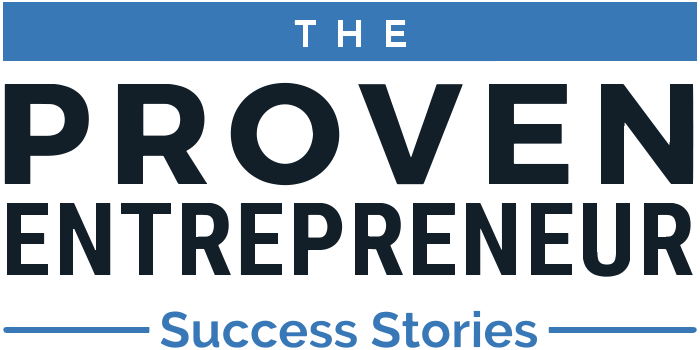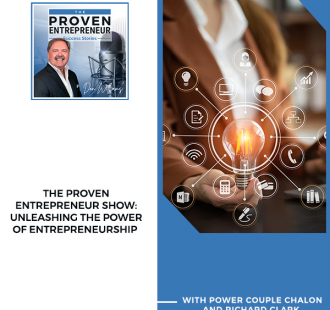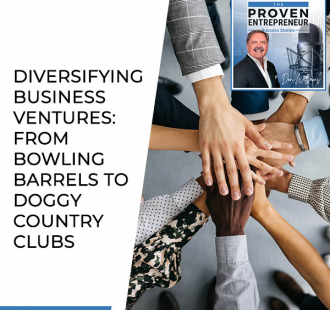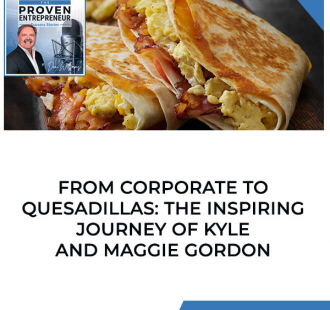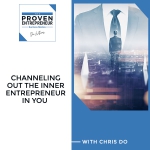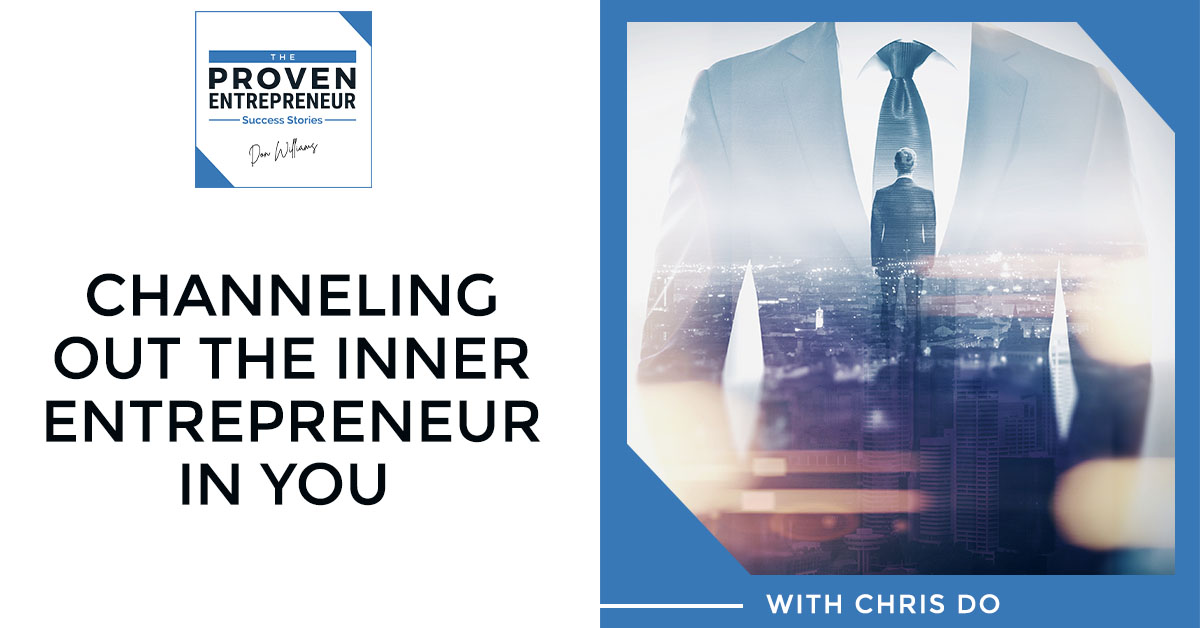
Chris Do, part of a family of refugees from Vietnam, left the country on April 30, 1975, the collapse of Vietnam due to communism, landed in Kansas City, Missouri, narrate how he accidentally become an entrepreneur right after he graduated from art school. Let’s find out in today’s episode the power of manifestation and being around the right people for the success of your business.
A book by John Fitzgerald called the adventures that a great brain was about a family of three boys who grew up in the Midwest at a turn of the century. And so the great brain, as described by his younger brother, who wrote the story, was always concocting the schemes to swindle the kids out of their money. And back then it’s like a penny could buy you stuff, a lot of things. And so he’d always invent different things. And we’d go on this crazy adventure of the great brain. And I read this, and I didn’t know at that time, but the great brain was an entrepreneur, he figured out how to use a smart and give the people, his classmates, and his friends what it is that they wanted. And he found a way to profit while everybody was happy. So the great brain was out fishing, and he would sell what he caught to his neighbors. This book inspires Chris to manifest that he’ll be successful one day. Little did he know, that manifestation is so powerful, it leads him to his very first investor.
—
Listen to the podcast here
Channeling Out The Inner Entrepreneur In You With Chris Do
On this episode of The Proven Entrepreneur, I am so excited. Our guest is Chris Do. Chris has founded two 7-figure businesses. The first of which is Blind, which is an Emmy award-winning motion design studio over $80 million in total billings. The second is The Futur, an online education company whose mission is to teach one billion people how to make a living doing what they love. Chris, welcome to the show.
Thanks for having me.
I’m so thrilled you’re here. I’m very grateful. Let’s jump right into it. Think back to early Chris where you were raised, your family. Was there a childhood moment that was the moment of conception when looking back, you say, “That may have started my entrepreneurial journey?”
Yes. My background is I’m a first generation immigrant. My parents, my brothers and I were refugees from Vietnam. We left the country in April 30th, 1975, the collapse of Vietnam due to communism, landed in Kansas City, Missouri and basically had to rebuild our life, culture and family from scratch. My parents were quite busy, working whatever they could do to provide for me and my brothers.
I’m the middle child of three. Growing up, there was always this idea that there were lots of love and support but not a lot of wealth. When I would wake up, my parents were gone. When the sun went down, they were home. It was both of them working up until the time in which I was nearly done with high school.
My older brother is four years older than I am. He would be the explorer. He’s the person who’s going to figure out the world. In a way, he became my surrogate father because dad was too busy. He didn’t understand the culture of America. My brother, one day, came home with his book and threw it on the table. He said, “Read this book.”
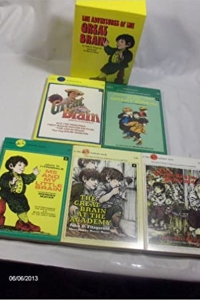
It was a book by John Fitzgerald. It’s called The Adventures of the Great Brain. It was a family of three boys who grew up in the Midwest in the turn of the century. The Great Brain, as described by his younger brother who wrote the story, was always concocting schemes to swindle the kids out of their money. Back then, a penny can buy you stuff and a lot of things. He’d always invent different things and we’d go on this crazy adventure.
I read this and I didn’t know at that time, but The Great Brain was an entrepreneur. He figured out how to use his smarts and give the people, his classmates and his friends, what it is that they wanted. He found a way to profit while everybody was happy. That started to plant the seed in my brain like, “This is the way I want to move about in life. I want to invent things. I want to make things and hopefully, I’m successful. I get to hire people to work for me.”
That manifested itself in many different ways. I would almost copy what The Great Brain was doing. The Great Brain was out fishing and he would sell what he caught to his neighbors. I went to the creek and tried to catch and sell things to my neighbors. I went one for one. I would buy candy in junior high and sell it to my classmates. This kept escalating to the point in which I started a motion design firm in 1995.
How old were you when you came to the United States, to Kansas City from Vietnam?
I was three years old.
I’ve been to both Vietnam and Kansas City. It’s a big culture shock. The book was almost a physical mentor. What about the moment of conception or birth? What was the moment when you said, “I’m going to start this business?” Maybe that was 1 of your 2 seven-figure businesses, maybe not, but the first business, the moment of entrepreneurial birth.
Hire people to teach you what you need to do. Click To TweetWhen I graduated school, I had an opportunity to work at a couple of different companies. I didn’t last very long in these companies. Something would happen. I would say to myself, “This isn’t right for me. There is something about the way management is done or the work that I was doing that was unfulfilling.” Ultimately, I quit the two jobs that I had and then I started to freelance.
In freelancing, I moved up the chain fast because my educational background in Graphic Design prepared me for the job market. I was arriving in the marketplace with more skills. This was an awesome thing. Out of the blue, my uncle calls me up and says, “I’ve known you for your whole life. I know you want to start a business. If you’re ready, my business partner and I would to start a design firm with you being the principal.”
I was thinking, “How could this happen?” I’m barely months out of school. My uncle is telling me he has a business partner that wants to start a business. He said, “We’re going to be in Los Angeles. We’ll meet you at the Westin Bonaventure. Prepare a business plan.” I didn’t know what a business plan is. This is the dawn of the internet. It’s not like I can jump on the internet and search out a business plan and get templates made for me.
I called my former roommate. His father is an investment banker. In an hour, he broke down like, “Here’s what you need to have.” I worked for days putting together this business plan. It’s 7 or 8 pages along with years of financial projections. I’m an art school kid. We meet at the Westin Bonaventure. We sit down for dinner. I’m nervous. I’m not running on much sleep. I’m wearing a fitted jacket. I’m trying to look professional. I hand over the business plan.
Bob is my uncle’s business partner. He thumbs through it quickly. He’s like, “I like this.” You cannot read that fast but he’s looking for some key things. After having dinner together, he says, “This is going to be an act of good faith gesture.” I’m like, “What is he talking about good faith gesture?” He reaches inside his coat pocket and whips out his checkbook.
I’ve never even seen this done before. He writes me a check for $5,000 on the spot, tears it out and hands it over to me. I was thinking, “What is this happening here? I didn’t even know what I’m doing. You wrote me a check for $5,000, no strings attached.” That’s how I start my business. That’s the moment of conception.

That’s an amazing story. I loved your comment, “I was an art kid.” One thing I’ve learned in three and a half decades of entrepreneurship is releasing your inner artist, whatever that is. It is your superpower. You boldly went where Chris had not fought to go before and it worked out. Can you share maybe a warp speed moment, a time when business was progressing at a certain pace and then all of a sudden, “We’re doing double, triple, quadruple, ten times?” We find that often in an entrepreneur’s story where all of the sudden everything is working very well.
We’ve been in business for a couple of years. We’re firing on all cylinders and things were going well. I started to notice that we were plateauing. We were hitting some financial ceiling. Right around then, we’ve been in business for maybe 4 or 5 years. We’re doing about $2.1 million, $2.2 million, $2.3 million. I was feeling, “This is it. I’ve hit my ceiling.” I told my wife because we had a windfall of profit that year. I said, “I need to hire some people. I’m going to hire some people to teach me to do what it is that I need to do.”
It happened that one of my friends, an industry person, had invited me to lunch. We’re sitting down and you make small talk, “How are things going?” He pauses and says with effusive energy, “Last year has been so great. We doubled our business.” His name is Hugh. I’m like, “Hugh, how did you do that?” He says, “We hired this business coach.” We kept talking.
I was thinking in my mind, “Ask him who the business coach is. Is this polite?” I sum up the courage and say, “Do you mind sharing this business coach with me?” Hugh was taken aback a little bit. He is like, Yes, okay.” The business coach’s name is Keir McLaren. I called Keir. Keir meets me at my house. We talk and he teaches me how to run my business essentially. I thought at this point in my life, I was good at talking to clients and winning them with my verbal skills, and how I would talk about art and design.
I’m talking to big Madison Avenue ad agencies. He said, “You’re doing it all wrong.” I was a little shocked. I was like, “What do you mean? I’ve been doing this for years. I make millions of dollars. What are you talking about?” He says, “How do you know what the client wants when you never ask them?” I was thinking, “That’s not right, Kier. I’m supposed to use my artistic alchemy and figure it all out.”
He goes, “You ask people. It’s okay to ask.” Keir gave me permission to ask people for what they want. It was awkward and weird at the beginning, but now I’m a big proponent for asking and never assuming. In that first year, we went from $2.1 million to $3.9 million. We almost doubled our billings because he taught me how to ask.
It’s how you process your failures and how you move on that determine your future success. Click To TweetOne thing we teach clients in the romancing your customer version of selling is that statements tell but questions sell. It’s certainly much easier to sell somebody something they want to buy than to sell them something you want to sell. Many times they’re not the same. Looking back, you’ve been an entrepreneur for how long, Chris?
I’ve been an entrepreneur since 1995. It’s 26 years now.
Can you share an event, a failing something that did not work well, but that in retrospect has turned out to be instrumental towards where you are?
If you’re any true entrepreneur, you have a book deep of failures. It’s how you process those failures and how you move on that determine your future success. I’ve had many setbacks. One of which was a failed business partnership in the birth of The Futur. When I was running this service design company called Blind, a friend of mine from school appeared out of nowhere. I was seeking some guidance from him in web design.
In that first introduction, we rekindled a relationship. He told me about this idea that he’s running an education company. It coincided with exactly what I wanted to do. He said, “Let’s go in business together.” I’ve been a bad business partner before. I’m reluctant to go into business with someone else. I need to do it my way. It’s the thing I need to do, but I agree.
We started this company together. It’s called The School, and this was in 2014. We started to run this education company. My friend, Jose, could not be more different than I am, looking every which way. He’s more spiritual. I’m more pragmatic. He’s a little bit more Bohemian. I’m a suit and tie guy. I care about the numbers. He cares about feelings but we made it work.

We made it work for about two and a half years, but it came to head as we started to pull apart. Our vision, work ethic, everything that we wanted was so diametrically opposed. There was not enough overlap in the commonality that ultimately we had to split up. It was very difficult for me because at that point, when we started, he was my mentor, and I had learned so much from him. I felt like if I broke up the relationship, I was responsible for the failure. I carried it with me for a long time until it came to a boiling point.
I told him, “It’s more important for us to remain friends than for us to have a business together.” I see them moving in separate paths at this point. He didn’t want to break up but ultimately we did. To me, that was a big failure but it gave me the space that I needed to find my own way to become the teacher that I was meant to be, and create the education company I’ve always wanted to have. As soon as we broke off, after the healing happened, the company took off.
What are you working on? What’s important in your business life?
The thing I’m trying to sort out is, “Can an education company like ours who sells knowledge products, do it in a way that’s ethical, in the way that we market to people?” I see there are companies who, subjectively speaking, have a single product that offers something that’s inferior to what it is that we do, but they use all the traditional, tried and true, methods of marketing with ClickFunnels, email tripwires, the soap opera email sequence, and the webinars, and it’s sale. There are tons of pressure to buy scarcity principles. They’re doing well financially.
I think, “Is there a different way? Is there a way for us to sell products that are ethical?” I think of traditional schools like Harvard, Princeton or Yale. Like any good school, they’re not out there trying to pressure to you to buy because there’s a limited supply of what they have, and demand far exceeds supply. I need to figure that out. It’s all about trying to figure out, “Are we a lifestyle business? Are we going to be able to put a dent in a universe in terms of changing the face of education?”
If you had one thing you could share with, Chris, 25 years ago that you’ve learned along that path, what would be the number one thing you would share and tell yourself?
The world needs to hear your voice and learn what you have to offer. Click To TweetI would tell myself, “You’ve got to get out of your comfort zone. You’re an introverted person but the world needs to hear your voice and learn the things you have to offer. There’s a lot to offer. You’ve got to get on this content game ASAP. No matter how much it makes your skin crawl and the panic attacks that you’re going to have, push through it, persevere, and you’ll be rewarded for it.”
Comfort zone physics works like this. We’re in our comfort zone and like it there because it’s comfortable. When we step out of our comfort zone, that’s uncomfortable. The physics portion is, “Once I step out of my comfort zone, my comfort zone expands to encompass that step also. With the next step out, it expands again and so on.”
In my own path, I try and do something that scares me every day. I’m trying to run out of my comfort zone as fast and as often as I can. Most people probably find that they’re better than they thought they were almost every time. Does everything work out? Maybe not initially, but even the failings at the time were brutally painful but in retrospect, they were the best thing to happen to me. Let me ask you this. How can The Proven Entrepreneur plan support Chris?
We have done over 800 videos on YouTube in the last few years. The ask there would be to watch and consume some of our content. If it resonates with you, like and share it with somebody else that you care about. That would do wonders for our channel.
Is that your personal channel?
No, it’s the company channel, The Futur.
There you have it. If you’ll goto YouTube, find The Futur channel, like, comment, share, and give Chris some love on YouTube. Do you have any last thoughts or a piece of advice you would feel comfortable sharing that you think entrepreneurs should know?
The one thing I would share is networking is who you know and influences who knows you. You have something. You want to change the world. You want to make it a better place. You want to make an impact to do the work that matters. You’re a genius. You have to get on that bicycle, start getting an increase in your influence and establishing some level of authority and expertise.
This game of social media feels like it’s for the young people and people who are good with technology, but it’s for anyone that has a story to tell. There is a platform out there for you. It may not be on YouTube or TikTok. It could be on LinkedIn, Medium or somewhere else. I want to encourage you all to share your voice and your story because it’s going to impact somebody out there.
Chris, thank you so much. I’m grateful. We’ll see you next time on the show.
Important Links
About Chris Do
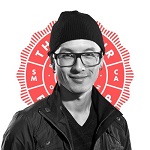
Chris Do is an Emmy award-winning designer, director, CEO and Chief Strategist of Blind and the founder of The Futur—an online education platform with the mission of teaching 1 billion people how to make a living doing what they love.
